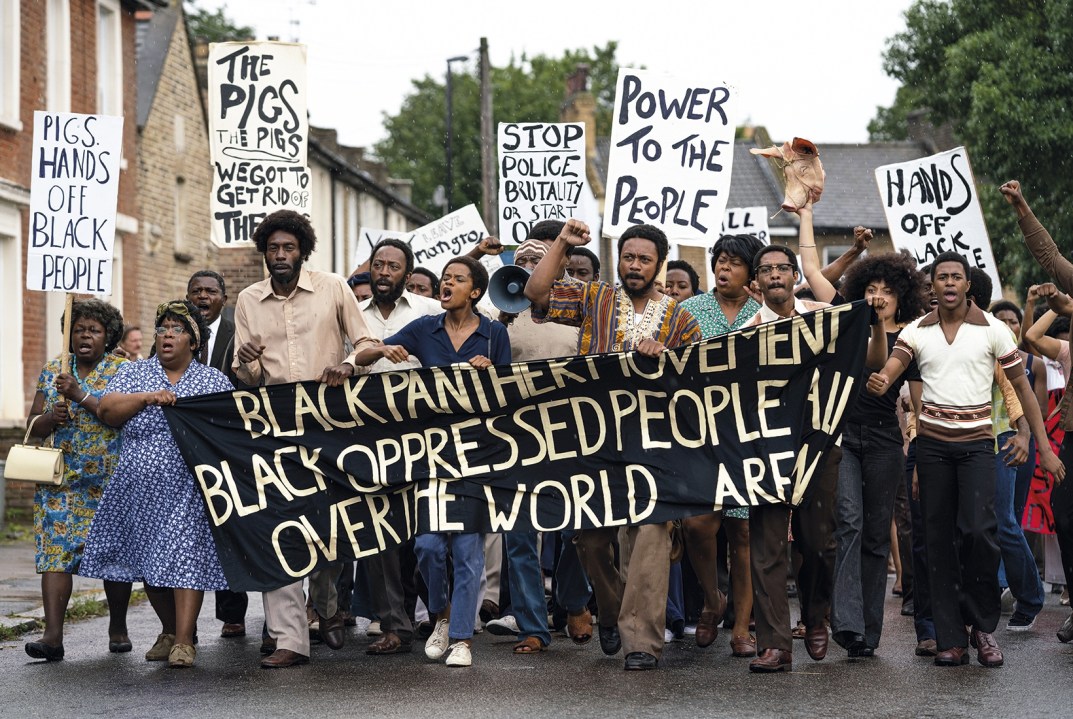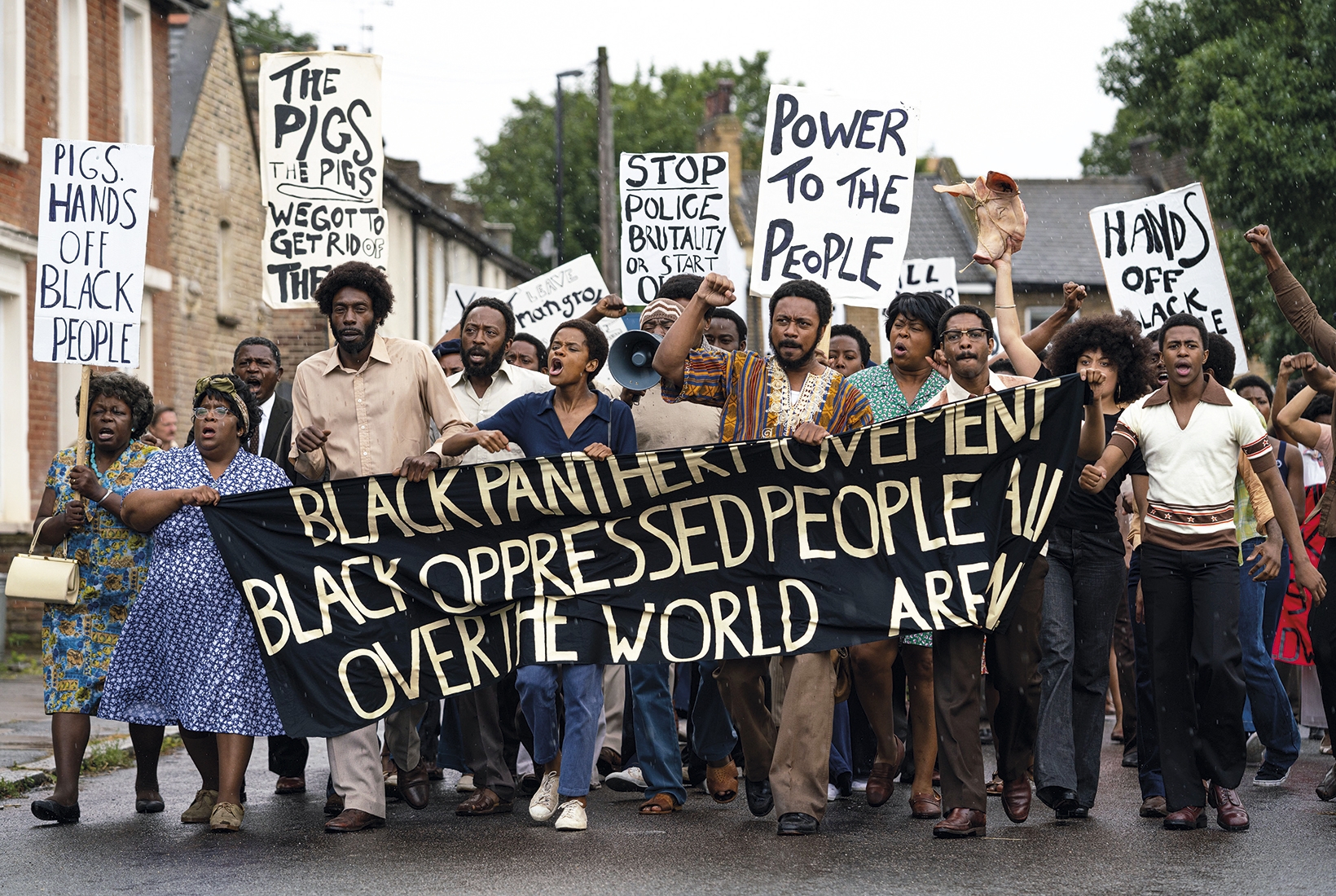Unlike with every other BBC period drama series these days, I didn’t have to sit through Small Axe: Mangrove grumbling about the implausible and anachronistic diversity casting. Mangrove was the West Indian-owned restaurant in Notting Hill which, in 1970, became the subject for a landmark Old Bailey trial involving nine of its habitués on trumped-up charges of riot and affray.
Though it gets much better once we’re actually in court, the first hour’s build-up is awfully slow. I fear writer/director Steve McQueen is to blame. He has an artist’s eye for the visual side of things: the look and feel of late-1960s west London — just as the Westway overpass was being built and W10/W11 still looked more like a bombsite than London’s most bijou postcode — are well captured. I was going to say ‘lovingly’ but ‘punctiliously’ is probably a better word for a director who doesn’t seem terribly comfortable with warmth, humour or emotion.
It really is life-affirming to see a stuffy Establishment get its comeuppance at the hands of ragamuffin mavericks
Take his portrait of the Mangrove restaurant’s Trinidadian-born proprietor, Frank Crichlow. As played by Shaun Parkes, Crichlow comes across as a grouchy, introspective sort, which may well be accurate, but he’s not the kind of engaging character for whom you find yourself rooting. None of them are, in fact. Some, like the orotund Marxist Darcus Howe (Malachi Kirby), are too pompously full of themselves. Others, like Altheia Jones-LeCointe (Letitia Wright) and Barbara Beese (Rochenda Sandall), are slightly tiresome, humourless revolutionary harridans. Sure, the court victory they and fellow members of the Mangrove Nine won was sociologically and historically significant. But McQueen should have tried harder to show us and persuade us of this, rather than merely tell us. If Top Boy could make us empathise with murderous gangsters, how come McQueen can’t manage it with wronged innocents?
And where is the cultural context? We know that the Mangrove — and its predecessor, El Rio — were hubs of the 1960s counterculture, where black icons like Jimi Hendrix and Nina Simone could have rubbed shoulders with white lefties and hipsters like Vanessa Redgrave, Colin MacInnes and Richard Neville. But you get no sense of that from McQueen. Though Crichlow had a white partner, this is barely acknowledged; neither is the melting pot nature of the 1960s Notting Hill scene. Rather, the Mangrove he chooses to show us is like a spaceship full of black people that has landed on the All Saints Road in totally hostile territory run by white racist policemen.
I’m fully prepared to believe that PC Frank Pulley, the embittered rogue copper apparently mainly responsible for the numerous vexatious and outrageous raids on the Mangrove, was a wrong ’un. Between January 1969 and July 1970, the café was raided 12 times — which was what prompted the demo outside a local police station, which in turn led to the trial. But by dwelling with such pornographic relish on the racism and wanton brutality — endless close-ups of unattractive white faces contorted with hatred; a long, lingering shot of a colander rocking from side to side after yet another vindictive police raid — McQueen makes it feel, rather as he did with 12 Years a Slave, that you’re being given a finger-wagging lecture, rather than a nuanced portrait of a particular era.
Yes, it gets much more exciting once we’re in the Old Bailey — as how could it not? First, courtroom dramas are invariably satisfying; second, it really is joyous and life-affirming to see a stuffy, unyielding Establishment get its comeuppance at the hands of ragamuffin mavericks — the Mangrove Nine in the dock, some, including the eloquent and lapidary Howe representing themselves, others represented by the idealistic, Rugby- and Cambridge-educated Scottish lefty lawyer Ian Macdonald.
Probably the best thing in the drama is Alex Jennings’s judge, Edward Clarke. He starts out stiff, intransigent, almost outraged by the temerity of black people in wanting a fair hearing. But at the end he reveals himself not to be the racist monster the defence has half-caricatured him as being but merely a stickler for correct form and the proper workings of English common law.
This transition, as the court slowly, inexorably swings in the defendants’ favour (embodied by Howe’s destruction by cross-examination of the monstrous Pulley and by his eloquent closing speech which draws cheers from the gallery), is hugely satisfying. But frankly, it would have been even if you or I had directed it because the historic material speaks for itself. If McQueen were anywhere near as good as his inflated reputation, this ought to have been TV drama gold; instead, what we got was mere bullion dross.








Comments